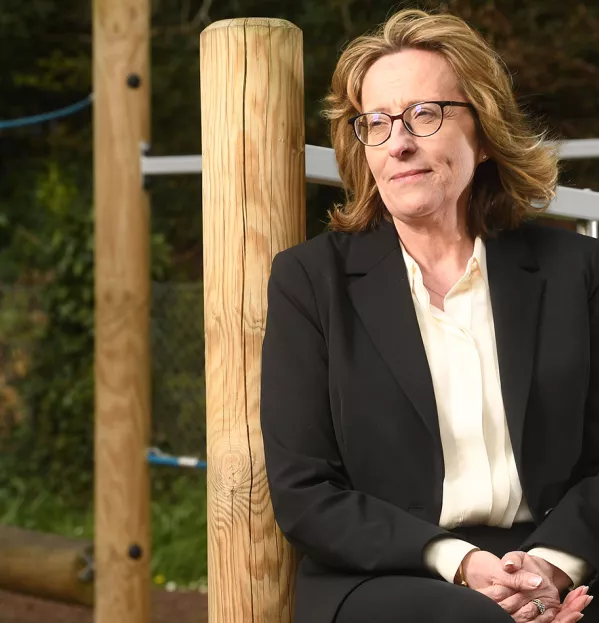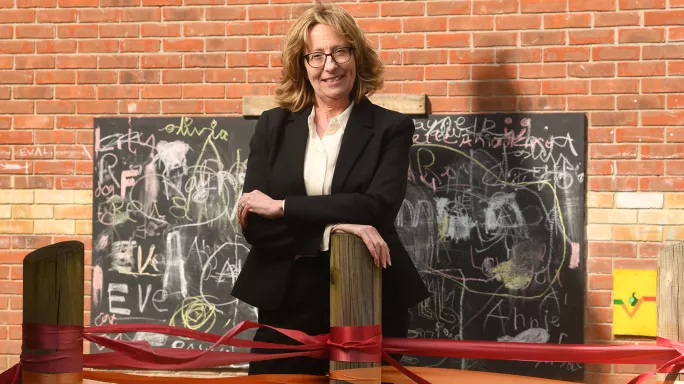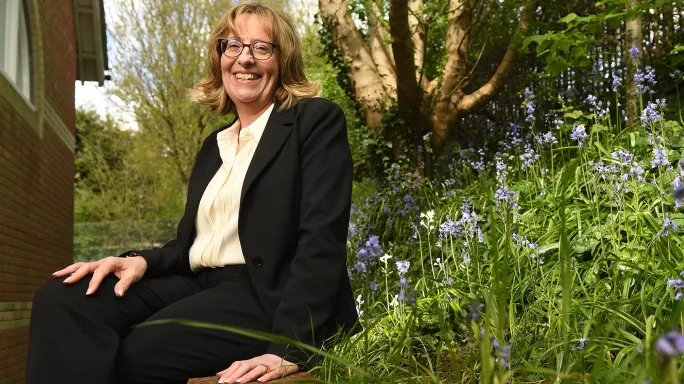- Home
- Leadership
- Strategy
- 10 questions with...Liz West
10 questions with...Liz West

Liz West is the chief executive of Initio Learning Trust, a multi-academy trust of 17 primary and secondary schools, primarily in Dorset. She has led trust since 2015.
Answering Tes’ 10 questions, she talks about inspirational teachers in her own school days (and an unusual way of delivering exam results), the power of school improvement journeys, the importance of talking with fellow trust leaders - and why early years needs to be given greater priority.
1. Who was your most memorable teacher and why?
I had some absolutely brilliant teachers but there’s one who really sticks in my memory: the deputy head of the all-girls’ school I attended, called Mrs Hargreaves.
At school I struggled with maths and I didn’t pass my maths O level. But I wanted to be a teacher and I needed maths, so I had to resit it.
Mrs Hargreaves believed in me, and said: “You can do this. I’ll be with you every step of the way.” And she was. She met me every single lunchtime and we did paper after paper, and she said: “You can do it, don’t lack confidence.”
I took the resit in November and I always remember when the results came in. I was in the sixth form and on stage during an assembly when Mrs Hargreaves appeared at the back of the hall and gave me a thumbs up. I think she was as thrilled as me because it was a sense of “We’ve done it!”
More Tes’ 10 questions:
- Jennifer Blunden, chief executive of Truro and Penwith Academy Trust
- Lorrayne Hughes, chief executive of Cumbria Education Trust
- Moira Marder, CEO of the Ted Wragg Trust
2. What were the best and worst things about school?
I had an amazing art teacher in sixth form where, unusually, I was the only pupil doing art. So I spent a lot of time with her and got to know her style and watch what she was doing.
I was really grappling to find what I enjoyed. Was it watercolours or oils? She helped me find the medium I most enjoyed working with: mixed media. She gave me confidence in my ability.
On the worst, I wasn’t a straight-A pupil, I was grafter - I had to work really hard to get the grades I needed. I used to compare myself to my friends because many of them were straight A pupils. I had to learn not to make those comparisons and just believe in myself and what I could achieve - that’s really helped me in my career.
3. Why do you work in education?
I really love working with children and young people. I love giving them self-belief and seeing them flourish.

Education should open the doors to what children and young people want to do. Being part of that is fantastic. When pupils you’ve taught grow up and you see they’re successful and happy, that’s why you do it.
4. What are you proudest of in your career?
I’m proudest of those individual children I’ve taught or supported - particularly those children who’ve perhaps not had the easiest start in education for whatever reason - and seeing them succeed.
Then also it’s about supporting schools to improve. Within the trust we’ve had a couple of schools that have moved from special measures to “good”, and supporting them on that improvement journey and seeing the pride come back to the school and the community makes you proud to be part of that journey.
5. Who would be your colleagues in your perfect school staffroom?
Staffrooms are great places when you’re surrounded by colleagues who are positive. So it’s about having really positive colleagues; people who are saying, “Yeah, we can do this!”
You also want a really healthy dialogue. You want staff who are problem-solving. And there should be a real sense of fun.
I was in a school recently and the level of dialogue was incredible. Staff we’re talking, saying, “Well, have you tried it this way? What about this way?” They were problem solving together. It was lovely to hear.
6. What are the best aspects of our school system ?
I think one of the most exciting things is building great trusts as amazing learning organisations.
What I absolutely love within a trust is that leaders - and I am talking about leaders in finance, in premises, in health and safety and headteachers and so on - have that space to grow and be innovative and problem-solve and pilot ideas. I think it’s something we can embrace even more in the future.
7. What can we improve?
Finance is a huge issue. We’re facing real-terms cuts, and that is really challenging - at a time when we know there’s greater need within our schools.

Part of that is how do we encourage people to come and work in the education system? We see there is a real crisis around recruitment and retention, and we really to need to address that. But we have not cracked how to do it.
8. Who in education has influenced you the most?
Somebody I’m sure lots of people talk about is Leora Cruddas from the Confederation of School Trusts. She’s inspirational to listen to, to speak to. And the way she challenges us as a group of leaders, it is phenomenal.
I also enjoy talking to colleagues and other CEOs as part of Queen Street Group [a group of MAT leaders]. They’re CEOs from a range of different trust shapes and sizes in different parts of the country and I get a huge amount from those conversations.
9. If you became education secretary what would you do?
I’d spend time in schools across the country to really get to know schools in all forms and shapes and sizes. As part of that I would consider the government’s spending on schools because that’s a huge issue having a real frontline impact.
I’d also want to consider children’s mental health. We know it’s a huge issue. I think Dame Rachel de Souza [the children’s commissioner] said it was like a tsunami facing us - so we need to get better at dealing with it.
Then we’ve got a gap between our most disadvantaged pupils and other pupils, and that’s not good enough. What are we doing about that?
And finally I’d look very closely at early years: what are we doing for our preschool children before they come to school? We know many of our youngest children are not school-ready, so what are we doing about that? Because if you don’t start early enough, you’re always on catch up.
10. What are the most important lessons you’ve learned?
When you make decisions, base them on what’s right for the children and young people in your organisation. Don’t get swayed by the external environment. Always bring it back to, “if I make this decision is it going to be positive for the children in my organisation?”
Look outwards, learn from others. Always be willing to have challenge from others - you can always do better and it’s always good to be outward-facing and listening.
Ask for help. I think that’s a big thing. It’s not a weakness to ask for help, actually it’s the opposite. So you need to find the right people to be able to ask for help, too.
Liz West was talking to Dan Worth
You need a Tes subscription to read this article
Subscribe now to read this article and get other subscriber-only content:
- Unlimited access to all Tes magazine content
- Exclusive subscriber-only stories
- Award-winning email newsletters
Already a subscriber? Log in
You need a subscription to read this article
Subscribe now to read this article and get other subscriber-only content, including:
- Unlimited access to all Tes magazine content
- Exclusive subscriber-only stories
- Award-winning email newsletters



